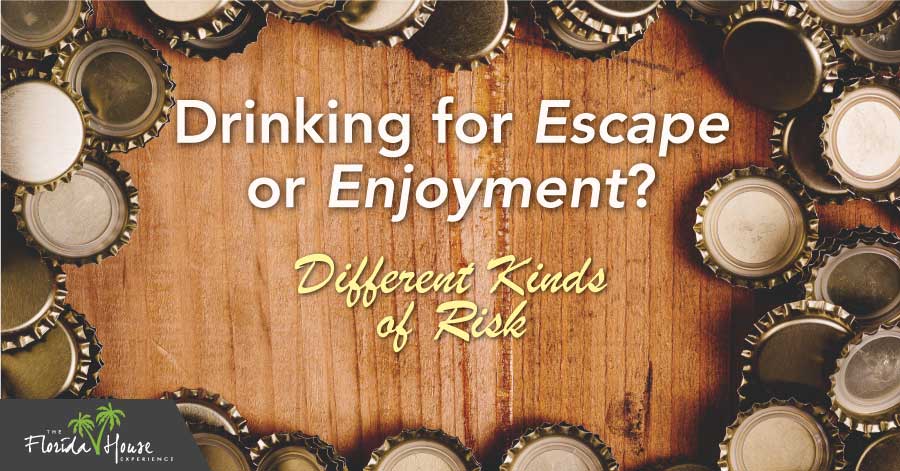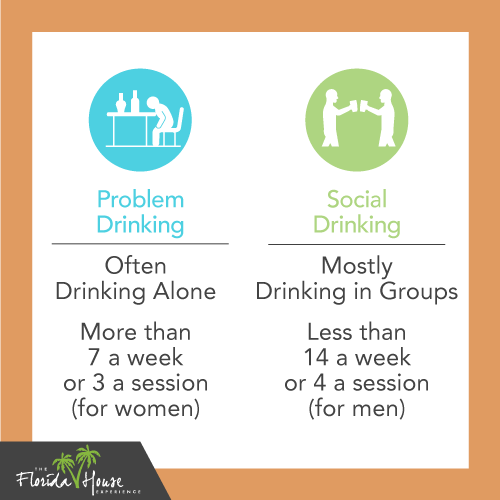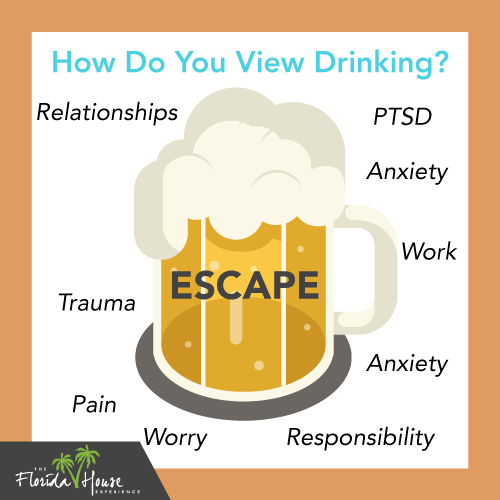
Of all the substance abuse problems we treat at FHE Health, alcoholism may be the most complicated for patients to navigate. Why is this? Most likely, it’s because with other abuse disorders, the user tends to know what they’re doing is wrong. Merely using many other drugs is illegal, and in the case of legal drugs (like prescription pain relievers or benzos), the user knows that they shouldn’t be misusing them.
Alcohol, on the other hand, is legal to consume in all 50 states. More than this, it’s normalized to the degree that it’s often encouraged in social situations. This makes it difficult to detect the point at which drinking goes from (relatively) harmless to binge drinking: consumption at an unhealthy level, often preceding alcohol use disorders.
But why is binge drinking alcohol more socially acceptable in some cases than others? For example, social binge drinking is glorified in some settings, while drinking to disassociate from reality, also known as “escape drinking,” isn’t. Why is this, and is this the right way to view drinking as a whole?
The short answer is no. Binge drinking is never healthy, and no matter the reason, it can lead to some serious consequences with your health. Here, we’re going to discuss binge drinking in different contexts, the social implications and why drinking heavily is never a healthy option.
Drinking for Enjoyment
 It’s possible that drinking for enjoyment is more widely accepted because it is born out of low-risk habits. According to Psychology Today, “social drinking” is a phrase used to encompass drinking behavior with a relatively low level of risk. This means that drinking is limited to no more than 7 drinks for females a week and 14 for males, with a maximum per sitting of 3 and 4, respectively. This describes a large number of people who enjoy alcohol in the US.
It’s possible that drinking for enjoyment is more widely accepted because it is born out of low-risk habits. According to Psychology Today, “social drinking” is a phrase used to encompass drinking behavior with a relatively low level of risk. This means that drinking is limited to no more than 7 drinks for females a week and 14 for males, with a maximum per sitting of 3 and 4, respectively. This describes a large number of people who enjoy alcohol in the US.
While drinking in any amount isn’t considered “healthy,” having a few beers with friends or a glass or two of wine with dinner wouldn’t be labeled “risky” by any means.
The source highlights the blurry line between social drinking and problem drinking, particularly regarding traditional perceptions of alcoholism. During college, for example, binge drinking culture is prevalent. Many college students glorify drinking, especially drinking large quantities in short periods of time. This can lead to the continuation of this behavior after college is over, which is more what the article above refers to as “problem drinking.”
The result is something known as high-functioning alcoholism, in which a person is suffering from an alcohol use disorder but still loosely resembles a healthy person. In many cases, high-functioning alcoholics (HFAs) may not even know they have a problem.
HFAs can go considerable amounts of time without admitting they have a problem or letting those around them see the issue. We know that the longer addiction persists, the harder it is to treat effectively, making this type of alcoholism extremely pervasive.
It’s clear, then, that despite the fact that social norms have embraced binge drinking for enjoyment, it’s as unhealthy as any heavy drinking.
Drinking as an Escape
 The other side of heavy drinking isn’t so “glamorous” but is nonetheless extremely harmful to the people who do it.
The other side of heavy drinking isn’t so “glamorous” but is nonetheless extremely harmful to the people who do it.
While not as frequent as those who drink to be social, drinking to get away from reality is common, especially in a stressful modern world. There are many reasons why someone would want to escape:
- Low self-esteem
- Mental illness
- Stress at work or at home
- The pressures of daily life
- Reactions to trauma
There are countless reasons why a person may want to dissociate from their life, and drinking seems like the easiest way out. Here are a few examples:
An Atlantic article about a seemingly healthy middle-aged mother who started to drink more and more to escape from the pressure to have the “perfect” life is a great example that escape drinking doesn’t have to be in reaction to an outwardly negative situation. People who appear to have their lives put together can suffer from alcoholism, despite not being the textbook example of what society thinks an alcoholic is.
Another article, this time from The Guardian, illustrates an all-too-common story about a man who started drinking to escape his own anxiety. Over time, the crutch that was helping him deal with social situations became the thing that took over his life.
Escape drinking is the reason why certain events and behaviors are higher indicators of addiction than others. It’s why people with PTSD or other mental health problems suffer from addiction at a higher rate than healthy people. Binge drinking as an escape from some aspect of a person’s life doesn’t resemble binge drinking for enjoyment, but the result — alcoholism — is eerily similar.
Is There a Difference?
While we’re not here to say it’s better to drink for enjoyment than escape or the other way around, it’s not helpful to ignore the differences between the two. Comprehensive, effective treatment necessitates individualized care that takes into account the unique triggers and forces that anyone faces when struggling with addiction.
The point of comparing the two types of binge drinking in this piece is to draw attention to alcoholism in its many forms. Binge drinking for any reason is an indicator of addiction, whether the condition is advanced or just starting. As you begin to drink more and more, your body and brain will change in unhealthy ways. That’s why it’s so important to seek help, even if you don’t think you have a problem.
If you find yourself binge drinking on a regular basis, you may be suffering from alcoholism without knowing it. Contact the addiction treatment experts at FHE Health, and we’ll help you find a treatment that meets your needs.
References:
https://www.psychologytoday.com/us/blog/the-high-functioning-alcoholic/200904/social-drinkers-problem-drinkers-and-alcoholics
https://www.webmd.com/mental-health/addiction/features/high-functioning-alcoholic#1






